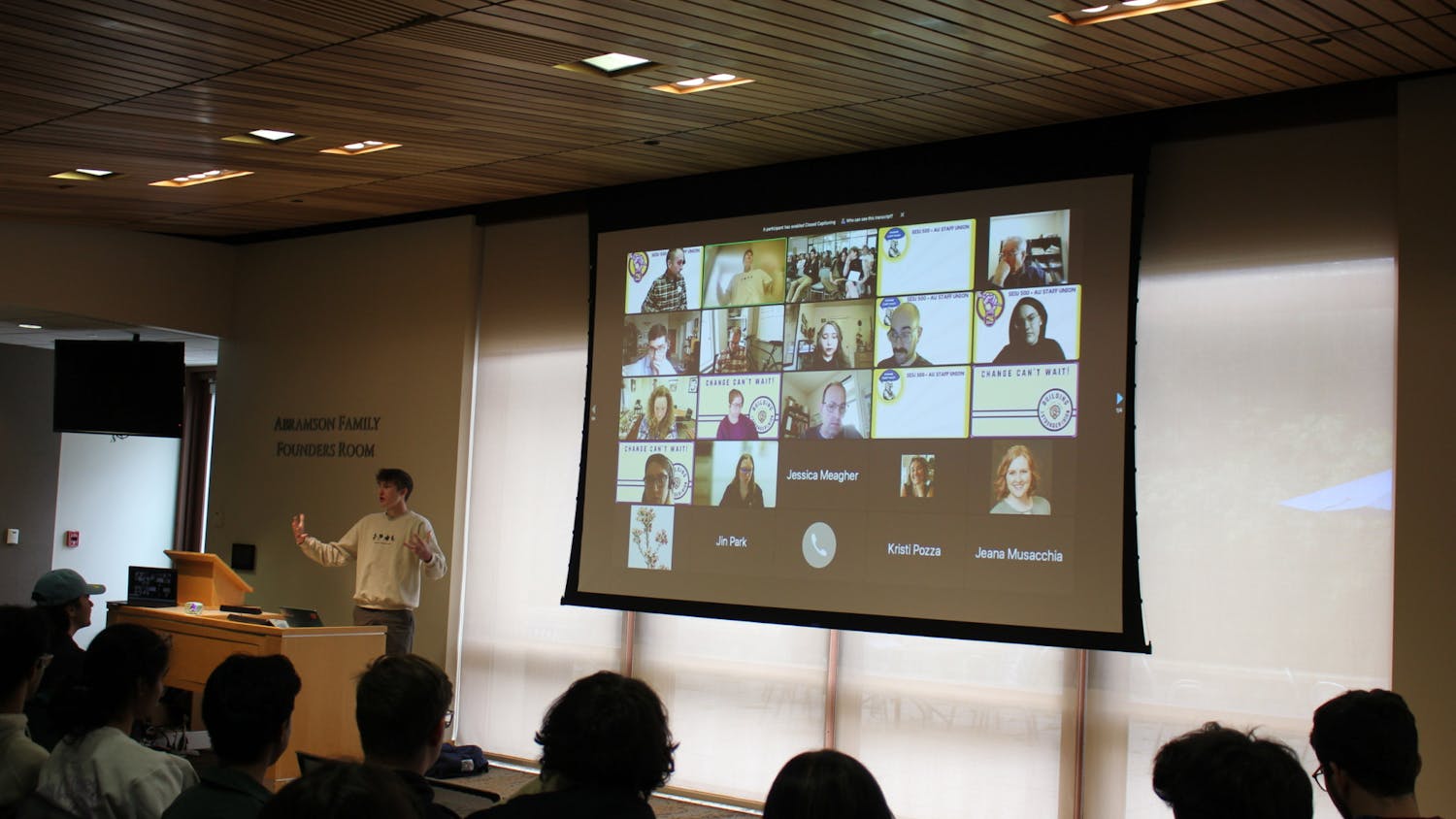Six neighborhood groups said they will reject the AU Campus Plan until the University and community can overcome “objectionable conditions.”
The conditions raised during the D.C. Zoning Commission hearing on Oct. 13 include:
• Instituting a cap on both AU student and faculty populations,
• Reduce the East Campus plan density and the number of dorms
• Reduce the height of North Hall
• Move South Hall, behind Centennial, to a new site
• Move new housing to the interior of campus, such as the amphitheater
• Reduce the size of the Beeghley addition
• Enforce effective noise control on campus
• Provide effective landscaping screening from neighbors
• Reduce size, mass and traffic of the proposed Washington College of Law in Tenleytown
East Campus objections
The Westover Place Homes Corporation president said East Campus should be altered so no building is taller than three stories and a sufficient buffer should exist with 100 feet between campus and the neighborhood.
Two of the proposed seven buildings on East Campus will have five stories and one will have six.
“Students are getting ready to go out when we are already asleep and coming home when we are getting up,” the president said. “That juxtaposition sets up a permanent conflict.”
Conflicting traffic reports
The parties opposed to the plan hired traffic expert Joe Mehra, president of the engineering consulting company MCV Associates, to evaluate AU’s traffic report. The report examines the impact of traffic on the community if the Campus Plan is approved.
Mehra said many of the statistics in AU’s traffic report, conducted by traffic consulting company Gorove/Slade, were incorrect.
He predicted that the time it takes for a person to drive from the Tenleytown Metro to campus will rise 10 percent from 2010-2020, instead of the one percent increase predicted by AU’s traffic report.
Parties opposed to the plan included:
• Westover Place Homes Corporation
• Spring Valley Wesley Heights Citizens Association
• Neighbors for a Livable Community
• Robert Herzstein, a resident living near Reeves Field
• Tenley Campus Neighbors Association
Noise complaints
AU renovated Reeves Field, including the addition of a scoreboard and sound amplifiers, about six years ago without the approval of the zoning commission.
Resident Robert Herzstein said the noise from the Reeves Field during games, practices and other events can be heard from inside his house.
“The effect has been compared to being in a war zone,” Herzstein said of hockey practices.
A certified consulting company of sound engineers took sound measurements from Herzstein’s residence, declaring the sound decimals exceeded those in the D.C. Noise Law.
Herzstein sought to resolve this issue by contacting both AU and the Metropolitan Police Department, but said he received little response and no action.
Chairman Anthony Hood expressed frustration at dealing with the same issue addressed in the last Campus Plan approval hearings.
“We’re having the same hearings about the same thing 10 years later, and that is unacceptable,” Hood said.
Residents speak up for Campus Plan
Some residents voiced their support for the Campus Plan during the zoning commission hearing.
Joe Vidulich, a 2008 AU alumnus and former Student Government president, said students have a positive impact on the Tenleytown area.
“I can speak personally from my own interactions with these students that … the majority of them are well-behaved, well-mannered and well-respected members of our community,” he said.
Wesley Heights neighbor Hal Hiemstra said students are good neighbors and even volunteer to help their neighbors.
“My 96-year-old neighbor praises the AU students for shoveling his lawn when it snows,” he said. “It’s really a competition between them and me.”
Students are also respectful of their neighbors, Hiemstra said.
“Never once have I heard loud music coming from those dorms,” he said. “Never once have I been woken in the middle of the night by inappropriate behavior.”
Tenleytown neighbor John Wheeler said he was upset by his fellow residents’ attitudes toward students.
“I feel very uncomfortable being in the same room with people, and one elected official, who have talked about students as a class being so repugnant, that it’s taken as a given that no one would want to live near them,” Wheeler said.
Students express need for more residence halls
AU students said the passage of the Campus Plan will allow more students to live on campus.
Michael Panek, D.C. Students Speak president and School of Public Affairs sophomore, said upperclassmen are more likely to live on campus if bigger residence hall rooms are available.
“After two years of the 85-square-foot room, it gets a little old,” he said.
Panek said residence halls are needed to reduce overcrowding on campus, especially for freshmen living in triples.
“Freshmen are really vulnerable, and it makes a hard transition even harder,” he said.
However, building more residence halls will not stop students from living off campus, he added.
“There are always going to be students who move off campus,” Hiemstra said. “I couldn’t wait to move off campus when I was a junior.”
Addressing off-campus parties
Panek said the issues between neighbors and students can be resolved through a dialogue the day after an incident occurs.
“[Over] 99 percent of students … they’ll say [they will] be conscious of the fact that they’re disturbing you, and a lot of the time, the relationship is resolved,” he said.
Deon Jones, Advisory Neighborhood Commission 3D commissioner and an SPA sophomore, said the “group homes” that are currently causing problems with neighbors should not set the precedent for all student neighbors.
“A few bad apples have magically created a whole bunch of bad apples,” Jones said. “This should not be the case.”
Tom Hier, chairman of Ward3Vision, a group of residents working to create a better neighborhood, said older students typically live in the neighborhoods and do not cause such a big problem.
“As they [students] get older, they get less and less crazy about partying,” Hier said.
This Zoning Commission hearing was the sixth of seven meetings, according to AU Media Relations Camille Lepre. People opposed to the plan and the final rebuttal to the Campus Plan will present at the next meeting Nov. 3.
pjones@theeagleonline.com




